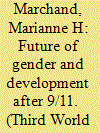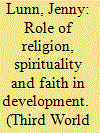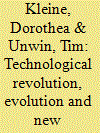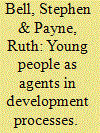|
|
|
Sort Order |
|
|
|
Items / Page
|
|
|
|
|
|
|
| Srl | Item |
| 1 |
ID:
089227


|
|
|
| 2 |
ID:
089237


|
|
|
|
|
| Publication |
2009.
|
| Summary/Abstract |
Asian countries are experiencing demographic transition from a young to an increasingly older population. The ageing of populations is unfolding against a context often characterised by persistent poverty, gender vulnerability, economic strain, constricted public resources, and limited civil institutions to support the elderly. Two key interlinked dimensions are important: first, how social and economic changes have affected or will affect the well-being and support situation of present or future older people, and how older people's needs and position in society relate to development and the consequences for policy. The paper identifies the gaps that exist in our understanding of ageing in Asian developing countries and discusses the key issues, tensions and perspectives that characterise current debates at local level and their implications for development in many Asian developing and some transitional countries. The paper urges recognition of ageing and development as part of poverty reduction strategies.
|
|
|
|
|
|
|
|
|
|
|
|
|
|
|
|
| 3 |
ID:
089229


|
|
|
|
|
| Publication |
2009.
|
| Summary/Abstract |
Development economics is currently dominated by an orthodoxy that is totally intolerant of alternatives and depends upon seeing both economy and society as based upon the incidence of market and institutional imperfections. This is characterised as 'zombieconomics' as it feeds in a reductionist and parasitical fashion on more widely cast and methodologically opposed methods, especially those associated traditionally with development studies and the old or classic development economics. This paper explains how this situation came about in the light of the evolution of economics more generally, and explores how development economics has become Americanised, more influential within development studies, policy- rather than critically oriented, and subject to an agenda increasingly set by the World Bank. It concludes by pointing to the challenges and the opportunities open to development studies as neoliberalism experiences a profound crisis to which the new development economics can only offer partial and piecemeal responses.
|
|
|
|
|
|
|
|
|
|
|
|
|
|
|
|
| 4 |
ID:
089228


|
|
|
|
|
| Publication |
2009.
|
| Summary/Abstract |
This paper reports on one element of a research project on Holocaust survivors who subsequently became prominent in the emerging field of development studies. Part of the extended interviews with survivors involved retrospective reflections on the evolution and current state of their branch of development studies. This material, augmented by an interrogation of their published work, provides fascinating 'insider' perspectives on the kaleidoscope of changing ideologies, theories, discourses, policies and practices subsumed under the label of 'development'. While the particular nature of this set of interviewees calls for caution in generalising from the findings, they appear far less unrepresentative than might be imagined, both because the subjects are diverse in terms of nationality, age, socialisation, wartime experiences and subsequent career tracks, and because they forged prominent contributions to, and were shaped by, the evolving Zeitgeist of development during an era when its imperative was virtually unquestioned. The paper incorporates interviewees' own voices, interpreting their perspectives in terms of their personal characteristics and positionalities and in relation to contemporaneous development debates. It thus contributes both to the history/archaeology of development and to ongoing critical debates about its nature.
|
|
|
|
|
|
|
|
|
|
|
|
|
|
|
|
| 5 |
ID:
089231


|
|
|
|
|
| Publication |
2009.
|
| Summary/Abstract |
The area of gender and development has been a site of critical contributions to the field of development studies and has been characterised as bridging practice, policy and theory. Since the policy of gender mainstreaming has been accepted, however, much of the originality and issues raised by the gender and development field have been marginalised and excluded from the development (policy) agenda. Some even argue that gender has been written out of the post- 9/11 development agenda thanks to the new global security regime. This article goes beyond these debates and suggests new ways of thinking about gender and development. Instead of arguing that it is 'dead', I argue that it is the site of innovative and critical thinking about development issues in a transformed and globalised world. The starting point for my argument is the insights provided by postcolonial feminism and transnationalism. While the former has contributed to feminist theorising through such concepts as representation, 'othering' and the silencing of Third World women's voices, the latter helps us understand new global realities resulting from migrations and the creation of transnational communities.
|
|
|
|
|
|
|
|
|
|
|
|
|
|
|
|
| 6 |
ID:
089236


|
|
|
|
|
| Publication |
2009.
|
| Summary/Abstract |
As part of broader neoliberal economic policies most governments of Latin America and sub-Saharan Africa have implemented reforms of the formal health sector since the early 1980s. Driven both by the need for greater efficiency and calls for increases in patient choice and participation, these reforms have taken on different forms across the regions, but the main features have been decentralisation, increased user fees and the introduction of forms of health insurance. This paper considers the nature of these reforms, how the broad category of 'neoliberal health sector reform' has played out in different places and the impact of these reforms across socioeconomic groups.
|
|
|
|
|
|
|
|
|
|
|
|
|
|
|
|
| 7 |
ID:
089234


|
|
|
|
|
| Publication |
2009.
|
| Summary/Abstract |
International discourses on environment and development help to shape global shared understandings of environmental issues. This paper describes the environment and development history of Guyana and Jamaica through pre-colonial, colonial, independence and market liberalisation stages. Two opposing discourses are used to frame this history: a dominant global environmental discourse characterised by technical and 'scientific' expertise and hierarchical governance; and a counter-discourse emphasising local control over natural resources. This analysis serves as a first step in surfacing and understanding the highly complex and multifaceted nature of environmental issues in these locations. However, we conclude with the recognition that further work should go beyond a bipolar analysis to one taking a critical, multidimensional approach, in order to promote more sustainable management of natural resources than has previously taken place.
|
|
|
|
|
|
|
|
|
|
|
|
|
|
|
|
| 8 |
ID:
089233


|
|
|
|
|
| Publication |
2009.
|
| Summary/Abstract |
The failure to provide a safe supply of clean drinking water to over one billion people in the world remains one of the most telling indictments of development policy and practice. A series of studies within political ecology has taken this dramatic failure as an entry point into broader questions around the operation of power in the contemporary world. From basic questions around who is to blame for this catastrophic failure, to broader questions around the consolidation of forms of rule, this work provides a crucial lens on broader social and environmental questions. This paper provides an overview of recent work on the political ecology of water as well as mobilising a series of case studies from the author's own research in Durban, South Africa.
|
|
|
|
|
|
|
|
|
|
|
|
|
|
|
|
| 9 |
ID:
089232


|
|
|
|
|
| Publication |
2009.
|
| Summary/Abstract |
Religion, spirituality and faith have suffered from long-term and systematic neglect in development theory, policy making and practice, although there has been a noticeable turnover the past 10 years. This paper explores the role of religion, spirituality and faith in development in the past, present and future by applying three core concepts from critical theory-grounding of knowledge in historical context, critique through dialectical process, and identification of future potentialities for emancipation and self-determination. It concludes that religion, spirituality and faith have a role to play in the future of development, particularly in ensuring that it is appropriate and sustainable. The paper also serves to counter critics who claim that critical theory has no resonance to contemporary social research.
|
|
|
|
|
|
|
|
|
|
|
|
|
|
|
|
| 10 |
ID:
089239


|
|
|
|
|
| Publication |
2009.
|
| Summary/Abstract |
This paper provides an overview of recent developments in the use of information and communication technologies for development, and argues that, while they do indeed offer new potential for resolving some of the classic dilemmas of development policy and practice, insufficient attention has yet been paid to the lessons that can be learnt from previous information and communication initiatives
|
|
|
|
|
|
|
|
|
|
|
|
|
|
|
|
| 11 |
ID:
089230


|
|
|
|
|
| Publication |
2009.
|
| Summary/Abstract |
This article examines the rather awkward relationship between gender and globalisation. In particular, within development studies, doubts and confusion with respect to the coherence and interpretation of gender as a concept underlie this uneasy relationship. We demonstrate how persistent orthodoxies and dichotomous thinking characterise the unhappy marriage between gender and globalisation. Instead of doing away with gender, we elaborate a multidimensional gender approach, which is much needed from a scientific perspective as well as to enhance the political potential of feminist positions and analyses. Our approach situates gender within the global/local nexus; this is illustrated by a case study of gender and political representation in Mexico.
|
|
|
|
|
|
|
|
|
|
|
|
|
|
|
|
| 12 |
ID:
089238


|
|
|
|
|
| Publication |
2009.
|
| Summary/Abstract |
This paper explores the role of young people in development processes. This is achieved through an examination of the latest developments in literature concerning young people's identity, agency and experiences of power relations and by reflecting on our own empirical research with young people in Zambia (child-headed households) and Uganda (empowerment and sexual health). In particular, we discuss the opportunities and challenges faced by young people in terms of taking greater control over their own lives and contributing to the development of their communities. In doing so we further understanding of how young people (inter)act to improve their own lives and negotiate the challenging-and changing-realities and relationships they experience.
|
|
|
|
|
|
|
|
|
|
|
|
|
|
|
|
|
|
|
|
|